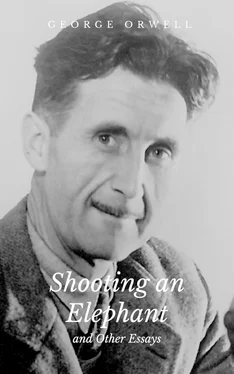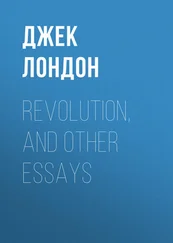The crowd grew very still, and a deep, low, happy sigh, as of people who see the theatre curtain go up at last, breathed from innumerable throats. They were going to have their bit of fun after all. The rifle was a beautiful German thing with cross-hair sights. I did not then know that in shooting an elephant one should shoot to cut an imaginary bar running from ear-hole to ear-hole. I ought therefore, as the elephant was sideways on, to have aimed straight at his ear-hole; actually I aimed several inches in front of this, thinking the brain would be further forward.
When I pulled the trigger I did not hear the bang or feel the kick—one never does when a shot goes home—but I heard the devilish roar of glee that went up from the crowd. In that instant, in too short a time, one would have thought, even for the bullet to get there, a mysterious, terrible change had come over the elephant. He neither stirred nor fell, but every line of his body had altered. He looked suddenly stricken, shrunken, immensely old, as though the frightful impact of the bullet had paralysed him without knocking him down. At last, after what seemed a long time—it might have been five seconds, I dare say—he sagged flabbily to his knees. His mouth slobbered. An enormous senility seemed to have settled upon him. One could have imagined him thousands of years old. I fired again into the same spot. At the second shot he did not collapse but climbed with desperate slowness to his feet and stood weakly upright, with legs sagging and head drooping. I fired a third time. That was the shot that did for him. You could see the agony of it jolt his whole body and knock the last remnant of strength from his legs. But in falling he seemed for a moment to rise, for as his hind legs collapsed beneath him he seemed to tower upwards like a huge rock toppling, his trunk reaching skyward like a tree. He trumpeted, for the first and only time. And then down he came, his belly towards me, with a crash that seemed to shake the ground even where I lay.
I got up. The Burmans were already racing past me across the mud. It was obvious that the elephant would never rise again, but he was not dead. He was breathing very rhythmically with long rattling gasps, his great mound of a side painfully rising and falling. His mouth was wide open—I could see far down into caverns of pale pink throat. I waited a long time for him to die, but his breathing did not weaken. Finally I fired two remaining shots into the spot where I thought his heart must be. The thick blood welled out of him like red velvet, but still he did not die. His body did not even jerk when the shots hit him, the tortured breathing continued without a pause. He was dying, very slowly and in great agony, but in some world remote from me where not even a bullet could damage him further. I felt that I had got to put an end to that dreadful noise. It seemed dreadful to see the great beast lying there, powerless to move and yet powerless to die, and not even to be able to finish him. I sent back for my small rifle and poured shot after shot into his heart and down his throat. They seemed to make no impression. The tortured gasps continued as steadily as the ticking of a clock.
In the end I could not stand it any longer and went away. I heard later that it took him half an hour to die. Burmans were arriving with dahs and baskets even before I left, and I was told they had stripped his body almost to the bones by the afternoon.
Afterwards, of course, there were endless discussions about the shooting of the elephant. The owner was furious, but he was only an Indian and could do nothing. Besides, legally I had done the right thing, for a mad elephant has to be killed, like a mad dog, if its owner fails to control it. Among the Europeans opinion was divided. The older men said I was right, the younger men said it was a damn shame to shoot an elephant for killing a coolie, because an elephant was worth more than any damn Coringhee coolie. And afterwards I was very glad that the coolie had been killed; it put me legally in the right and it gave me a sufficient pretext for shooting the elephant. I often wondered whether any of the others grasped that I had done it solely to avoid looking a fool.
1936
Bookshop Memories
When I worked in a second-hand bookshop—so easily pictured, if you don’t work in one, as a kind of paradise where charming old gentlemen browse eternally among calf-bound folios—the thing that chiefly struck me was the rarity of really bookish people. Our shop had an exceptionally interesting stock, yet I doubt whether ten per cent of our customers knew a good book from a bad one. First edition snobs were much commoner than lovers of literature, but oriental students haggling over cheap textbooks were commoner still, and vague-minded women looking for birthday presents for their nephews were commonest of all.
Many of the people who came to us were of the kind who would be a nuisance anywhere but have special opportunities in a bookshop. For example, the dear old lady who ‘wants a book for an invalid’ (a very common demand, that), and the other dear old lady who read such a nice book in 1897 and wonders whether you can find her a copy. Unfortunately she doesn’t remember the title or the author’s name or what the book was about, but she does remember that it had a red cover. But apart from these there are two well-known types of pest by whom every second-hand bookshop is haunted. One is the decayed person smelling of old breadcrusts who comes every day, sometimes several times a day, and tries to sell you worthless books. The other is the person who orders large quantities of books for which he has not the smallest intention of paying. In our shop we sold nothing on credit, but we would put books aside, or order them if necessary, for people who arranged to fetch them away later. Scarcely half the people who ordered books from us ever came back. It used to puzzle me at first. What made them do it? They would come in and demand some rare and expensive book, would make us promise over and over again to keep it for them, and then would vanish never to return. But many of them, of course, were unmistakable paranoiacs. They used to talk in a grandiose manner about themselves and tell the most ingenious stories to explain how they had happened to come out of doors without any money—stories which, in many cases, I am sure they themselves believed. In a town like London there are always plenty of not quite certifiable lunatics walking the streets, and they tend to gravitate towards bookshops, because a bookshop is one of the few places where you can hang about for a long time without spending any money. In the end one gets to know these people almost at a glance. For all their big talk there is something moth-eaten and aimless about them. Very often, when we were dealing with an obvious paranoiac, we would put aside the books he asked for and then put them back on the shelves the moment he had gone. None of them, I noticed, ever attempted to take books away without paying for them; merely to order them was enough—it gave them, I suppose, the illusion that they were spending real money.
Like most second-hand bookshops we had various sidelines. We sold second-hand typewriters, for instance, and also stamps—used stamps, I mean. Stamp-collectors are a strange, silent, fish-like breed, of all ages, but only of the male sex; women, apparently, fail to see the peculiar charm of gumming bits of coloured paper into albums. We also sold sixpenny horoscopes compiled by somebody who claimed to have foretold the Japanese earthquake. They were in sealed envelopes and I never opened one of them myself, but the people who bought them often came back and told us how ‘true’ their horoscopes had been. (Doubtless any horoscope seems ‘true’ if it tells you that you are highly attractive to the opposite sex and your worst fault is generosity.) We did a good deal of business in children’s books, chiefly ‘remainders’. Modern books for children are rather horrible things, especially when you see them in the mass. Personally I would sooner give a child a copy of Petronius Arbiter than Peter Pan, but even Barrie seems manly and wholesome compared with some of his later imitators. At Christmas time we spent a feverish ten days struggling with Christmas cards and calendars, which are tiresome things to sell but good business while the season lasts. It used to interest me to see the brutal cynicism with which Christian sentiment is exploited. The touts from the Christmas card firms used to come round with their catalogues as early as June. A phrase from one of their invoices sticks in my memory. It was: ‘2 doz. Infant Jesus with rabbits’.
Читать дальше












